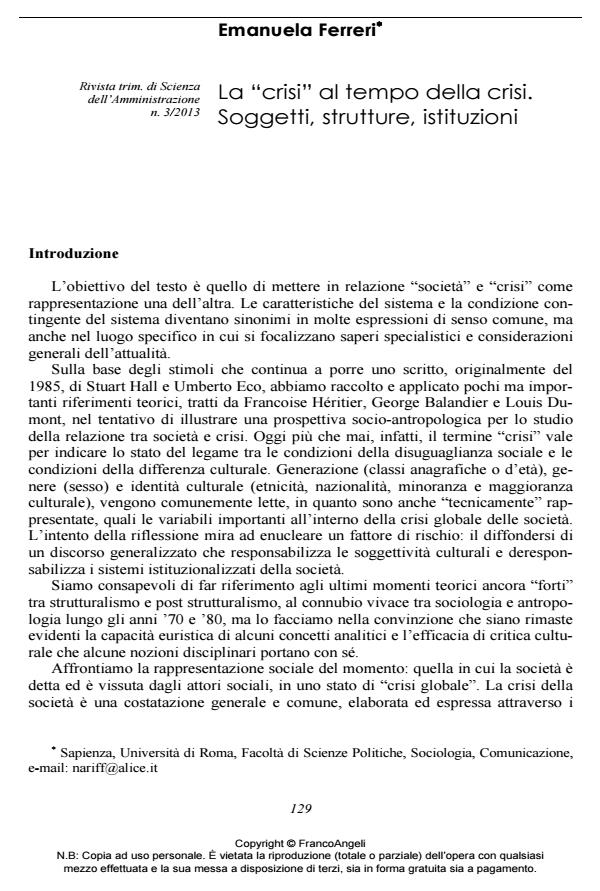Crisis at crisis time. Subjectivities, structures, institutions
Journal title RIVISTA TRIMESTRALE DI SCIENZA DELL’AMMINISTRAZIONE
Author/s Emanuela Ferreri
Publishing Year 2013 Issue 2013/3
Language Italian Pages 11 P. 129-139 File size 450 KB
DOI 10.3280/SA2013-003009
DOI is like a bar code for intellectual property: to have more infomation
click here
Below, you can see the article first page
If you want to buy this article in PDF format, you can do it, following the instructions to buy download credits

FrancoAngeli is member of Publishers International Linking Association, Inc (PILA), a not-for-profit association which run the CrossRef service enabling links to and from online scholarly content.
The aim of this paper is to relate "society"and "crisis", in terms of representation from one to the other, illustrating a socio-anthropological perspective for the study. Nowadays "crisis" means a relationship between the condition of social inequality with that of cultural difference. Gender (sex), generation (age group) and cultural identity (ethnicity, nationality, majority and minority) are examined as crucial variables within the context of the current global crisis. One particular risk factor within the crisis process is examined: a widespread feeling which assigns responsibility to cultural subjectivities while exonerating society’s institutionalised systems.
Keywords: Global society, social inequality, cultural differences
- Bhabha H.K. (2001). I luoghi della cultura. Roma: Meltemi.
- Balandier G. (1977). Società e dissenso. Bari: Dedalo.
- Boni S. (2011). Culture e poteri. Milano: Elèuthera.
- Corrao F., a cura di (2011). Le rivoluzioni arabe. La transizione mediterranea. Milano: Mondadori.
- Dumont L. (2004). Homo hierarchicus. Il sistema delle caste e le sue implicazioni. Milano: Adelphi.
- Dumont L. (1993). Saggi sull’individualismo. Milano: Adelphi.
- Epstain A. (1983). L’identità etnica. Tre studi sull’etnicità. Torino: Leoscher.
- Ferreri E. (2011). Identity and Diversity Today. In: Palmeri P., ed., Understanding Diversity in Development Processes. International Course on Applied Anthropology. Roma: Nuova Cultura.
- Gellner E. (1992). Causa e significato nelle scienze sociali. Milano: Mursia.
- Graeber D. (2007).Critica della democrazia occidentale. Milano: Eléuthera.
- Hall S. e Eco U. (2006). Il ruolo degli intellettuali è quello di creare delle crisi. In: Leghissa G., ed., Stuart Hall. Politiche del Quotidiano. Culture, identità e senso comune. Milano: Il Saggiatore, pp. 111-118 (ed orig.: Umberto Eco and Stuart Hall: In conversation. “The role of the intellectuals is to produce crisis”. The Listener, 16 May, 1985, pp. 14-16).
- Héritier F. (2004). Dissolvere la gerarchia. Maschile/Femminile II. Milano: R. Cortina.
- Parkin R. (2009). Louis Dumont and Hierarchical Opposition. Oxford: Berghahn Books.
- Pirri A., a cura di (2011). Libeccio d’Oltremare. Roma: Ediesse.
- Solinas P.G., a cura di (2005). La dipendenza. Antropologia delle relazioni di dominio. Lecce: ARGO.
Emanuela Ferreri, La "crisi" al tempo della crisi. Soggetti, strutture, istituzioni in "RIVISTA TRIMESTRALE DI SCIENZA DELL’AMMINISTRAZIONE" 3/2013, pp 129-139, DOI: 10.3280/SA2013-003009